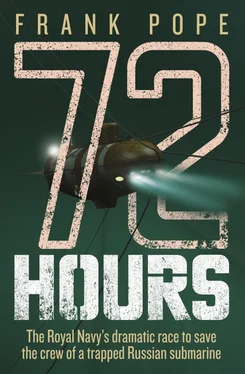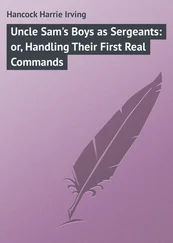It wouldn’t be the first time the Pacific Fleet had suffered trouble with fishing gear. In the late 1990s, a new experimental submarine detection system called Dnestr-B had been installed in the area. The system had been producing good results when suddenly, in 1997, it went blind. When the Navy went to go and have a look what had happened, they could not find the 120-metre-long, 15-metre-high float from the array. It had disappeared. Nothing more was heard of it for three years until, in 2000, the world’s news agencies began reporting that a huge, unidentified object had been spotted near Japanese shores. Somehow it had broken loose, very possibly having been snagged by a fishing net and dragged off its mooring.
If a fisherman tangled and lost a net on the hydrophone array there was no way he was going to report it as he was required to do. He would just cut the lines and let the evidence sink to the seabed. Captain Lepetyukha had become snagged before, but with patience and cunning – traits integral to the Russian Navy – it had always been possible to work free.
The drifting snow of particles in the water faded as the periscope panned sternwards and away from the bow floodlight, before becoming utterly black behind them. Lepetyukha’s moustache twitched. He could see nothing: the stern light was not working. It was on the long list of repairs awaiting AS-28 next month.
Milachevsky had not reported passing any other obstructions, and continuing ahead was a known risk. All eyes turned to the Captain. The Captain’s eyes turned to Gennady Bolonin. It was a telling moment. As the senior officer all orders must come through Captain Lepetyukha, but of the two men it was the civilian who knew the craft better, and had spent more time underwater within it.
In this case, however, there was not much doubt as to what the next move should be.
‘We must reverse around the cable,’ the Captain ordered.
Milachevsky slowly engaged the motors in reverse. With no light astern, he kept the periscope forward, watching the rope slide off the bow. A few more feet and it would be clear. Then their creeping retreat began to slow. The pitch of the motors deepened. Both he and the captain involuntarily spun round to look towards the hatch to the second compartment, only to hear the solid clunk of a large electrical relay tripping, and the sound of the main motor whirring to a halt.
In the second compartment, Warrant Officers Sergei Belozerov and Anatoly Popov sat in stunned silence. At the first impact with the array, Popov’s heart had missed a beat, but he’d soon calmed. He’d been trapped before, and after an hour or so they’d been able to work themselves free, and complete their task as normal. But this time the motor’s automatic cut-out had activated. That could only mean that something had caught around the propeller, wrapping itself so tight that the main motor was on the edge of burning itself out, and so had shut down. This was new. With no way of manoeuvring it was now impossible for them to remove the net.
Thursday, 4 August 2005
04.20 UK – 16.20 Kamchatka
Royal Navy lodgings, Bristol
It was still dark outside, but the streetlights stabbed across the bare bedroom through chinks in the ill-cut curtains. Commander Riches had woken up for no good reason, but his legs were tangled in the duvet as though he’d been fighting it. If he’d been dreaming, he couldn’t remember what about.
He lay awake for a while, trying to get back to sleep. It felt as though the dull, subsonic throb of the motorway in the distance was taunting him, each low swoosh of a truck mocking what his life had become. Perhaps in his dream he’d been back in a submarine, the sonar sweeping across an undersea landscape, probing for contacts.
He closed his eyes and tried to distance himself from the reality: a Services house tucked into the armpit of the M4/M5 motorway junction with no more excitement than a desk and a computer screen to look forward to when his nine-to-five day began.
That disastrous night back in 1990, on his Perisher command course, his submarine had also snared a net – but it was not him or his crew who had suffered. Three fishing vessels had been trawling in the area near them at the time. Although the fishermen knew there could be submarines below, it was up to the Navy crews to steer clear. That night the Hunter-Killer submarine was running silent, relying on passive sonar and able to gauge accurately only the direction from which a sound was coming, not the distance. At a crucial moment the noise of two fishing vessels had melded into one. Only when the submarine was far too close did the signals diverge. Seconds later, they were crashing through a trawl-net . Chains and cables wrapped themselves around the forward sonar dome, shearing off one of the two hull-mounted speed-sensors and causing its readings to go haywire (perhaps the cause of the loud bang heard through the vessel), but the 4,500 tonne submarine was barely slowed by the obstruction. On the surface it was a different story.
A 16-metre wooden fishing boat was mid-turn when suddenly the lines to her trawl-net wrenched the craft sideways with brutal force. Within seconds she was flipped upside down and dragged along the surface, her propeller thrashing the air faster and faster as her engine raced. No-one knows exactly how long the terrible, churning chaos lasted, but it was probably only a matter of seconds. The force rapidly overcame the vessel, and she was sucked beneath the surface. Three of her crew were still on board. The body of the fourth – the watchman – was only found when it appeared in a fisherman’s trawl nearly five months later.
Following the immediate response to the tragedy, the fallout began. A breakdown in the structure and standard of watch-keeping on the submarine was blamed, and the careers of both the student Duty Captain and the Course Commander suddenly hung in the balance. Riches had been minutes from taking over as Duty Captain, at which point the blame would have landed on his shoulders as well.
It was a lucky escape. Riches went on to pass the course, and spent the next three years as First Lieutenant (second-in-command) of HMS Resolution ’s Starboard Crew (ballistic missile submarines have two crews to man the vessel around the clock) , awaiting his first submarine command. But fate struck first. He was out on a training run when his left arm started tingling. He ignored it, and the feeling went away soon after he’d got his breath back. But on his next run the tingling was back, and a week later he reluctantly turned himself in to the doctor.
The doctor strapped him into a heart monitor, but as soon as Riches saw his face he knew he was in trouble. He should have known: his father had been living with angina, and his grand father had died of a heart attack. Now they were going to have to operate on him. Somehow he’d blocked out the possibility that he too would be affected, thinking that by keeping fit he’d escape his genetic destiny.
There was a glimmer of hope, however. The cardiac specialist who treated him said airline pilots were able to get back in the cockpit if they proved themselves fit enough. But when he was transferred back to base, the Naval doctor there refused to consider it. Although a thoracic consultant not a cardiac specialist, he declared that Riches would never serve at sea again.
The newly qualified officer fought it, and won the chance to prove himself fit a year down the line. He trained hard, ran the London marathon, and by the time his medical exam came around he was declared fully fit. But the mud stuck. The Navy’s promotion boards are an ancient ritual that are guided by a report from the candidate’s Commanding Officer, and his had mentioned a serious illness. The implication was clear: there was no way that he should be left in command of a nuclear submarine. Although he’d jumped every hurdle and qualified for command, he finally resigned himself to the fact that his dream was over.
Читать дальше












